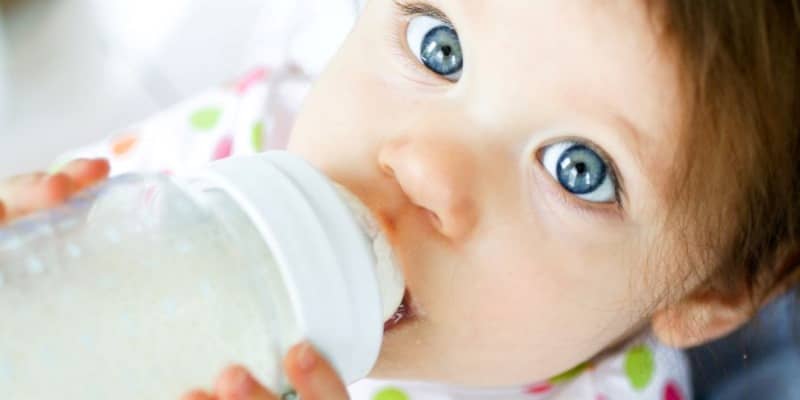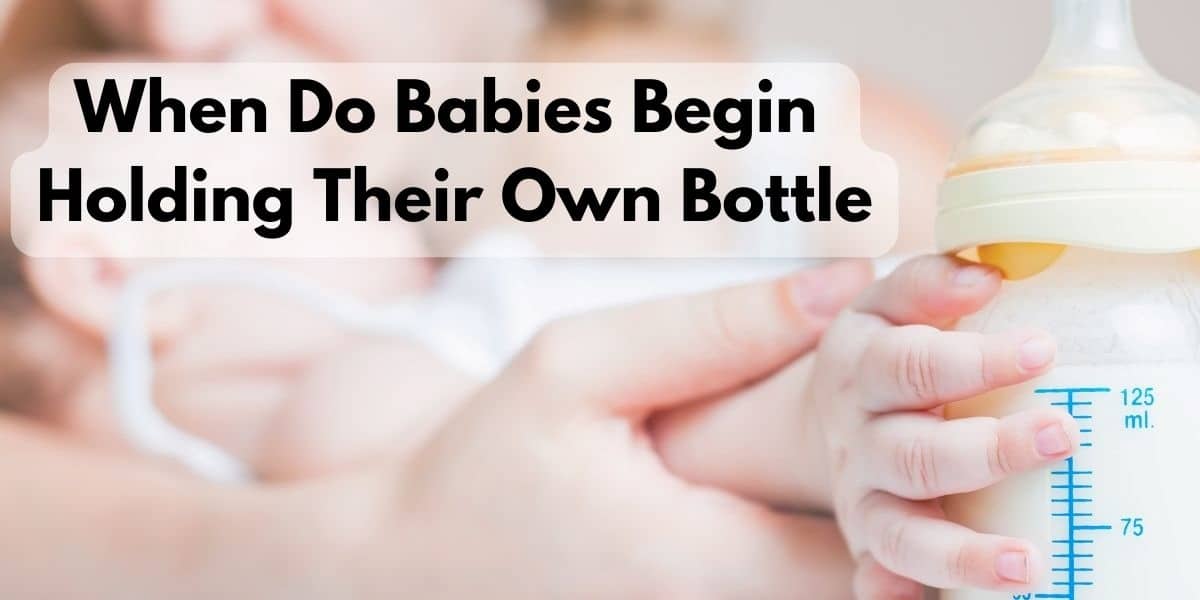Have you ever wondered at when do babies hold their own bottle? It’s a common question among parents, as the ability to hold their own bottle marks an important milestone in a baby’s development.
In this article, we will explore the typical age range when babies begin to hold their own bottle, along with some frequently asked questions to provide you with a better understanding of this exciting phase of their growth. So, let’s dive in and find out when babies start embracing their newfound independence!
Developmental Milestones
Babies go through various developmental milestones as they grow, and one important aspect is their physical development. This includes the development of motor skills, which are vital for their overall growth and independence. As a parent, it’s important to understand these milestones and know when your baby is ready to start holding their own bottle.
Physical Development
Physical development involves the growth and maturation of a baby’s body, including their muscles and bones. This development begins from birth and continues throughout their early years. Babies gradually gain strength and coordination, allowing them to perform more complex movements and tasks.
Motor Skills Development
Motor skills refer to the ability to control and coordinate muscles and movements. There are two types of motor skills: gross motor skills and fine motor skills. Gross motor skills involve large muscle groups and enable activities like crawling, walking, and running. Fine motor skills involve smaller movements, such as grasping objects and picking up small items. Both of these skills play a significant role in a baby’s ability to hold their own bottle.
Signs That Your Baby Is Ready
While every baby develops at their own pace, there are some signs that indicate they may be ready to hold their own bottle.
Hand-Eye Coordination
Hand-eye coordination is the ability to use the eyes to guide the movement of the hands. It is a crucial skill for holding and manipulating objects. If you notice that your baby has started tracking objects with their eyes and reaching out to grab toys or other objects, it could be a sign that their hand-eye coordination is improving. This indicates that they may be ready to hold their own bottle.
Motor Skills
As mentioned earlier, motor skills are essential for a baby’s overall development. When a baby begins to develop their fine motor skills, they gain more control over their hand and finger movements. They may start reaching out for objects, grabbing them, and bringing them to their mouth. These actions show that their motor skills are advancing and they might be ready to hold their own bottle.
Interest in Self-Feeding
Another sign that your baby may be ready to hold their own bottle is their interest in self-feeding. If you notice that they are reaching for their bottle during feeding time or trying to hold it on their own, it indicates that they have a desire to be more independent with their feeding. This interest in self-feeding is a positive sign of their readiness to hold their own bottle.
Age Range for Independent Bottle Holding
The age at which babies begin to hold their own bottle can vary. However, on average, babies may start to show the readiness for independent bottle holding between 6 to 10 months of age.
Around 6-10 Months
Around the age of 6 to 10 months, many babies have developed sufficient muscle strength and coordination to begin holding their own bottle. They have usually gained better control over their hands and fingers, making it easier for them to grasp and hold objects. This age range is a general guideline, and it’s important to remember that all babies are unique and develop at their own pace.
Variances in Milestones
It’s crucial to understand that developmental milestones can vary from baby to baby. Some babies may start holding their own bottle earlier than others, while some may take a little longer. Milestones should be used as a rough guide rather than a strict timeline. If you have concerns about your baby’s development, it’s always best to consult with their pediatrician.
Encouraging Independent Bottle Holding
As a parent, there are several ways you can encourage and support your baby in holding their own bottle.
Offer Appropriate Bottles
Choosing the right bottle can make a significant difference in your baby’s ability to hold it independently. Look for bottles with handles or grips that are designed to be easily grasped by little hands. The shape and size of the bottle should also be suitable for your baby’s developing grip strength.
Use Suitable Bottle Holders
There are various bottle holders available in the market that can assist your baby in holding their own bottle. These holders securely hold the bottle in place, making it easier for your baby to grasp and drink from it. However, it’s important to remember that bottle holders should be used as a tool to encourage independence, and not as a long-term solution.
Provide Supportive Environment
Creating a supportive environment for your baby can greatly contribute to their success in holding their own bottle. Ensure that they are sitting in an upright position, as it helps them have better control over their movements. Use pillows or cushions for added support if needed. Additionally, create a calm and relaxed atmosphere during feeding time, as stress or distractions may hinder your baby’s ability to concentrate on holding their bottle.
Potential Challenges
While some babies may readily embrace independent bottle holding, others might face certain challenges. It’s important to be aware of these challenges and address them accordingly.
Oral Motor Delays or Weakness
Some babies may have oral motor delays or weakness, which can affect their ability to hold and manipulate objects. If your baby is struggling to hold their bottle even after the age when most babies start doing so, it could be a sign of an underlying issue. In such cases, it’s advisable to consult with a pediatrician or a feeding therapist to evaluate and address the oral motor challenges.
Lack of Motor Coordination
Not all babies develop motor coordination at the same rate. Some may take longer to gain the necessary motor skills required for independent bottle holding. If you notice that your baby is having difficulty coordinating their hand movements or has trouble keeping a firm grip on the bottle, you can consult with their pediatrician for guidance and support.

Promoting Development
There are specific activities and practices you can engage in to promote and enhance your baby’s development in holding their own bottle.
Tummy Time
Tummy time is a crucial activity for building strength in a baby’s neck, shoulders, and arms. Regular tummy time sessions help strengthen their core muscles, which in turn improves their overall motor skills. Encourage your baby to play and interact with toys during tummy time, as this can also help develop their hand-eye coordination.
Practice with Age-Appropriate Toys
Introduce age-appropriate toys that require grasping and manipulation to encourage your baby’s fine motor skill development. Soft toys, rattles, or textured objects are ideal for this purpose. These toys provide the opportunity for your baby to practice holding and gripping objects, preparing them for holding their own bottle.
Potential Risks
While promoting independent bottle holding is important, it’s essential to be aware of potential risks that can arise during this stage.
Choking Hazard
Certain bottle accessories, such as bottle holders or propping devices, may pose a choking hazard if not used properly or under adult supervision. Always ensure that any accessories used are age-appropriate and safe for your baby.
Injury from Falling Bottle
When babies start holding their own bottle, there is a possibility of the bottle slipping or falling from their grasp. This can lead to injury or accidents. To prevent this, always supervise your baby closely during feeding time and be ready to intervene if needed.
Also Check: Establishing A Routine: 7 Month Old Sleep Schedule
Tips for Safety
To ensure the safety of your baby while encouraging independent bottle holding, here are some tips to keep in mind:
Supervise Bottle Holding Time
Always be present and closely supervise your baby while they are holding their own bottle. This allows you to address any potential risks or issues that may arise and ensure their safety throughout the feeding process.
Choose Safe Bottles
Select bottles that are specifically designed for babies and meet safety standards. Look for bottles that are BPA-free and have appropriate flow rates for your baby’s age. Checking the bottle’s condition regularly for any signs of wear and tear is also important to prevent accidents.
Keep Bottle Feeding Time Calm
Create a calm and soothing environment during bottle feeding time. Avoid distractions or loud noises that can disrupt your baby’s focus or cause them to become unsettled. Maintaining a peaceful atmosphere can help your baby concentrate on holding their bottle and improve their overall feeding experience.

Source: TheTechBrain AI
Frequently Asked Questions
How can I tell if my baby is ready to hold their bottle?
You can look for signs such as improved hand-eye coordination, developing motor skills, and an interest in self-feeding. These indicators suggest that your baby may be ready to hold their own bottle.
What if my baby is not showing any interest in holding their bottle?
All babies develop at their own pace, and some may take longer to show readiness for independent bottle holding. Keep offering opportunities for practice, and consult with your pediatrician if you have concerns about their progress.
Is it okay to use bottle holders and propping devices to aid my baby in holding their bottle?
Bottle holders and propping devices can be used as tools to encourage independence, but only under close adult supervision. It’s important to use them safely and appropriately to avoid any potential choking hazards or accidents.
Conclusion
Babies typically begin holding their own bottle between 6 to 10 months, but this can vary for each child. Signs of readiness include improved hand-eye coordination, motor skills development, and an interest in self-feeding. As parents, we can encourage independent bottle holding by offering appropriate bottles, using suitable bottle holders, and providing a supportive environment.
It’s important to address any potential challenges, promote development through activities like tummy time and playing with age-appropriate toys, and prioritize safety at all times. Remember, every baby is unique, and their developmental journey should be celebrated and supported at their own pace.
